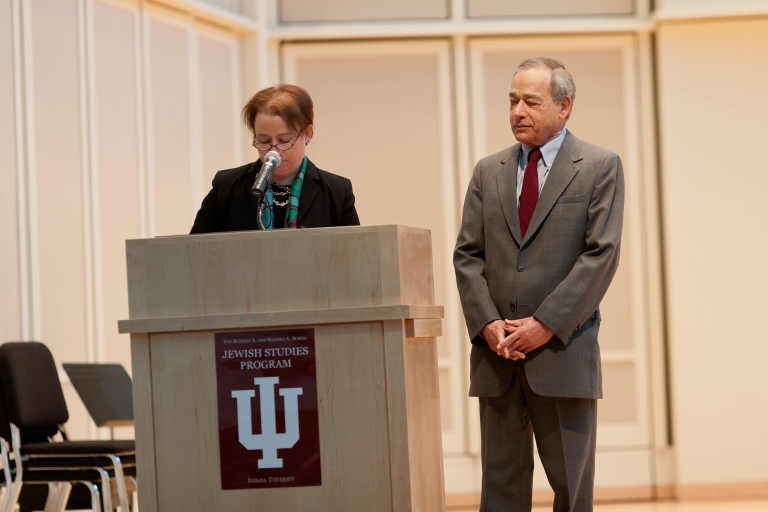The killing of 11 worshippers last month at the Tree of Life Synagogue in Pittsburgh brought the message home: Indiana University’s Institute for the Study of Contemporary Antisemitism, established to study the global resurgence of the hatred of Jews, is more relevant and essential than ever.
“I think everybody was surprised and shocked” by the shooting, said Alvin Rosenfeld, the institute’s founding director. “There was no precedent for something like that in American history. There have been numerous violent incidents against Jews, but there has never been an attack on a synagogue in this country that led to so many deaths.”

Since the Pittsburgh incident, Rosenfeld and Günther Jikeli, a research scholar at the institute, have done media interviews, written newspaper columns and engaged in other forms of outreach to help people understand the damage done by what has been called “history’s oldest hatred.”
“One major thing we can do is educate, educate and educate at all levels,” Rosenfeld said.
Rosenfeld, the Irving M. Glazer Chair in Jewish Studies and a renowned scholar of the Holocaust, founded the institute in 2009. Like many scholars, he had believed that organized hatred of Jews was pushed into the shadows with the defeat of Nazi Germany in World War II.
“I was simply wrong,” he said. “Over the last two decades, antisemitism has been on an upsurge, on a global basis. It is, once again, a potent form of social pathology, and a threatening one.”
The IU institute is the only research institute at any U.S. university devoted to studying and combating contemporary antisemitism. It has hosted four scholarly conferences – with a fifth scheduled in March – produced a notable series of publications with IU Press and helped to launch Antisemitism Studies, now the leading journal in the field.
Much of the institute’s initial focus was on Europe, where antisemitic attacks have been common in the past two decades and where anti-Jewish attitudes are found among far-right political movements, extreme leftist opponents of Israel, and some Muslim immigrants and refugees. But the U.S. also has a history of virulent antisemitism, including the conspiracy theories promoted by industrialist Henry Ford and 1930s radio broadcasts by Father Charles Coughlin.
In the postwar era, most American Jews have felt they could live in peace without being targeted, Rosenfeld said. But recently, that has changed. The Anti-Defamation League reported nearly 2,000 antisemitic incidents in 2017, a 57 percent increase over the previous year. In New York City, police said antisemitic incidents increased 22 percent this year, while overall crime was down.
What happened? One factor is the spread of hatred and falsehoods on the internet and especially via social media, a phenomenon that Jikeli and his students have studied. Another is the rise of an emboldened “alt right” movement that includes white supremacists and white nationalists.
It was shocking, Rosenfeld said, that Holocaust deniers and Nazi sympathizers were candidates for congressional seats in several states in the 2018 midterm elections, and that at least three of them received tens of thousands of votes each.
Another factor is the polarization of American politics, which has helped extremist views get a wider hearing. Rosenfeld said it was disappointing that President Donald Trump failed to unambiguously condemn the deadly Unite the Right rally in August 2017 in Charlottesville, Virginia.
“There is no evidence that President Trump is an ideological antisemite,” Rosenfeld said. “At the same time, he is a very unconventional president, and a lot of his rhetoric is overwrought, divisive and accusatory. Antisemites take comfort in that.”
What can be done to counter the threat? Rosenfeld puts education at the top of the list. That includes teaching, writing, public speaking, and conducting research and sharing it at conferences and meetings – the kind of work the Institute for the Study of Contemporary Antisemitism systematically does. All of it helps to better inform the work of other educators and also to shape the work of policymakers.
Legislation also plays a role, he said, pointing out that Indiana is one of the few states that don’t have a hate-crimes law that provides harsher penalties for crimes that are motivated by bias. The role of law enforcement, he said, should include not only enforcing the law but regularly monitoring incidents.
Finally, he said, America needs leaders who will recognize antisemitism as a serious threat that can’t be ignored but should be studied, understood and actively fought against.
“There is nothing like having people in power – in government, education, religion and every other sphere of public culture – speak out forcefully and unambiguously about the threats we all face,” he said. “If they remain unchecked, everyone will suffer, not just Jews.”

